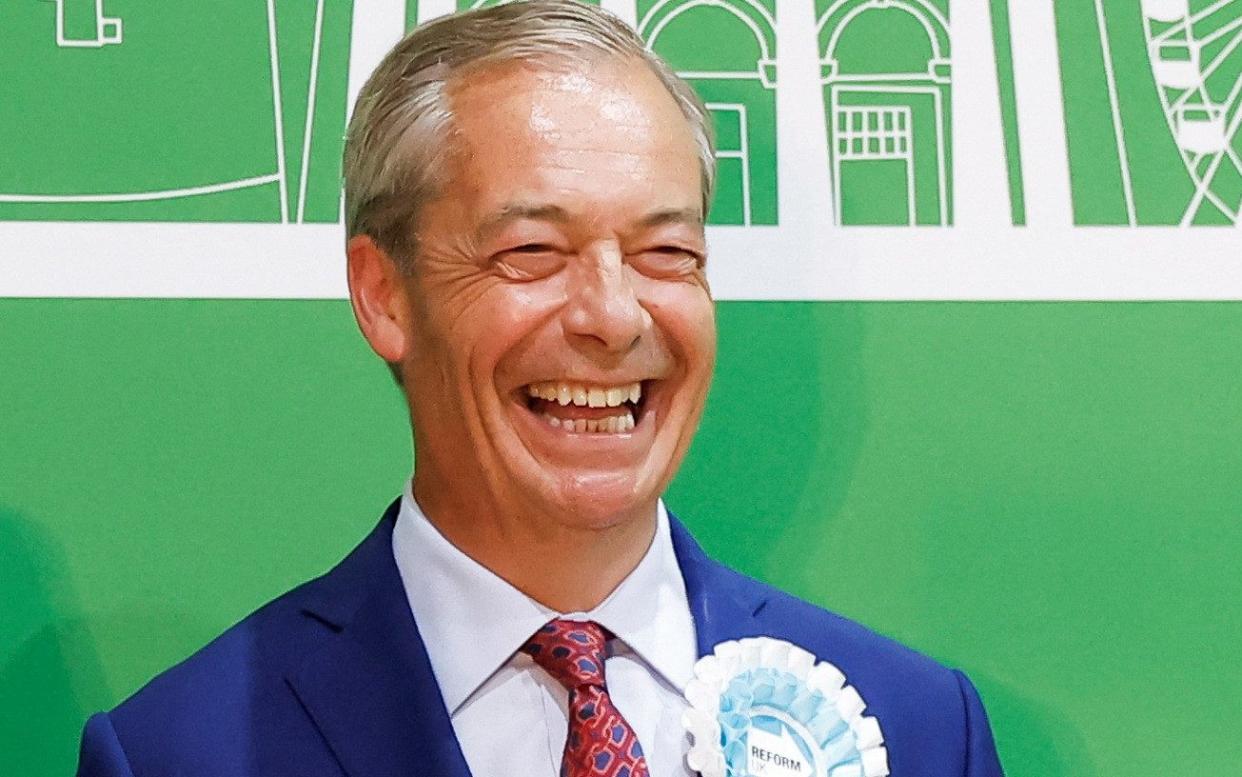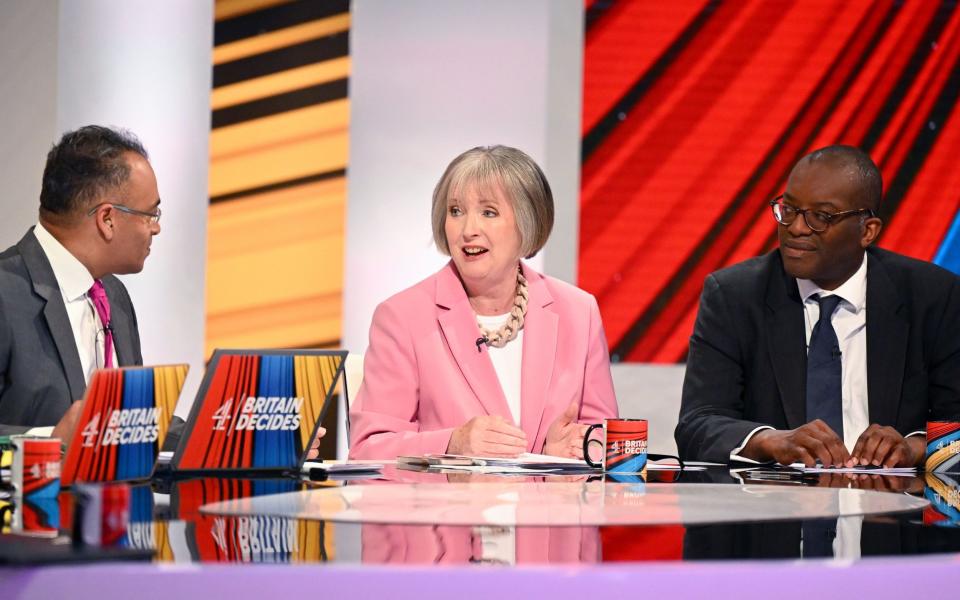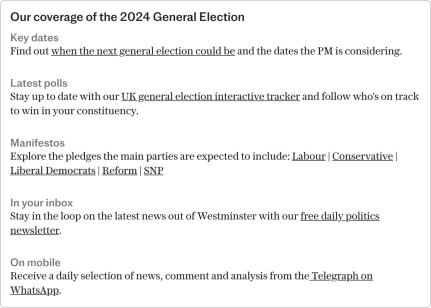The elite liberals on our screens could barely stomach that Reform was the big story of the night

Brace! Brace! Brace! As the Conservatives accelerated towards the mountainside, engines screaming “Brexit means Brexit”, we waited eagerly for the exit poll at 10pm, snacks at the ready. How many Portillo moments would there be? Would it merely be a “bloodbath” or did a whole abattoir await sheepish Tory ministers?
On BBC One, ITV, Sky and Channel 4, crack teams of presenters ransacked the thesaurus for words that meant “really, really bad”. Chris Mason, BBC Political Editor, was first out of the traps with “pulverised”. When he saw the predicted numbers of seats, Mason said, “Blimey! The Conservative Party, so often an election-winning machine, looks pulverised.” “A shift in the political tectonic plates,” agreed Clive Myrie who was doing a rather dull and cautious double-act for the BBC’s election special with Laura Kuenssberg, not, shall we say, a natural comedienne. (You only realise how calm and authoritative Huw Edwards was on such occasions when he is absent.)
“Historic,” agreed Laura. (If you had a drink every time you heard “historic” you’d have been comatose by 10.50pm. Unfortunately, I had to stay sober to take notes.) “When Boris Johnson was elected, it was said he might serve as PM until the 2030s,” Chris Mason reminded viewers, causing a pang of almost unbearable nostalgia in those of us who recalled that moment when t’was bliss to be alive and be a Tory. “It was a Himalayan climb for Labour to get back,” Mason said, “and Sir Keir Starmer has done something extraordinary, pulling Labour back from where they were in 2019.”
But was it extraordinary? That became the big question of the night, chewed over by pundits, podcasters and veteran politicians like Harriet Harman (Baroness, natch) who lost no opportunity on the Channel 4 panel to point out that Reform were ghastly populists and it was “frightening to have their menacing presence in the Commons”. (Not that Harriet’s party ever allowed any IRA-supporting Marxists into senior positions, you understand.) On the surface of it, Labour had secured a matchless triumph. But, on Channel 4, as Gary Gibbon, one of TV’s great political sages, observed: “It’s the Conservatives’ worst-ever result, yet they’ll be sighing with relief.”

Gary was onto something. It was a horrible defeat, oh yes. The worst for 200 years, the worst since the Corn Laws, said someone, the worst since Noah’s Ark probably. But 131 predicted seats was not quite as terminal as some of the forecasts had led us to believe. Over a hundred Tory MPs still left plenty to form at least seven bitchy splinter groups to do battle for the tattered soul of their party. And, although Labour would have a stonking 412 MPs, the polling data revealed something more nuanced, as Jeremy Vine was there to tell us from his computer-generated geektastic set in a BBC studio.
Now, some of us are old enough to remember the fabled Swingometer made of cardboard, the movements of whose arrow were interpreted by the marvellous Canadian psephologist Bob McKenzie between 1959 and 1979. Things have come on a long way since then. In theory, at least. What Jeremy lacks in comprehensibility he makes up for in enthusiasm and windmilling limbs. He looked like a man stranded in a giant bathroom warehouse with Escher hexagonal tiles stretching as far as the eye could see. The tiles were votes, or maybe they were constituencies. “Over here,” said Vine, suddenly flinging up his right arm like a traffic cop, “in the safest seats – the Tories could defend them – it is a horrible, HORRIBLE sight for the Conservatives.” I find you want to believe Jeremy because he’s putting so much religious fervour into it, so asking what it means feels unkind.
One of the things the hexagonal tiles appeared to reveal was that Starmer’s party was winning lots of Tory seats while hardly increasing its vote share. The majority of British people, it turned out, didn’t much want a Labour government to cover their fields in pylons and have them arrested for misgendering their own children; they just had a passionate desire to see the back of the Conservatives, so they voted Reform, Liberal Democrat or Independent. That was what made this the weirdest general election result I can remember: a loveless landslide.
The best thing, as far as I was concerned, was that the mainstream media, which had shamelessly excluded Reform UK from its coverage, except for outraged reports of alleged racist incidents, was finally obliged to accord Nigel Farage’s upstart party its due. There could be no avoiding the fact that Reform had eaten Boris’s Brexit seats in the Red Wall for breakfast and was biting into Labour for lunch as well. Farage’s insurgents were the big story of the night. As result after result was declared, Reform was shown pushing the Conservatives into third even fourth place.
It was hilarious to observe the conniptions this upset to the natural order caused among the elite liberals who just happened to make up the bulk of studio guests on all channels. On ITV, former Tory chancellor George Osborne was still dispensing the progressive wisdom which had just seen his party as good as destroyed. “Rishi Sunak did not confront the demons in his party,” said Osborne disapprovingly. He meant the boisterous ghost of Boris and the socially-conservative Right-wing MPs. Yes, that appalling demon who four-and-a-half years ago, unlike Sunak, won the Conservatives an 80-seat majority! The lack of humility, let alone repentance, among Osborne and his tribe was gobsmacking.
In the wake of the Conservatives worst ever predicted election result since 1832 when the Duke of Wellington was at its head, George Osborne likened the results to the 'Tory party's Waterloo' pic.twitter.com/gsZ9KqpoTg
— ITV News (@itvnews) July 4, 2024
“People will look at these results and see Reform getting 13/14 per cent of the vote,” said Rory Stewart who was a panellist on Channel 4’s Britain Decides with his podcast sparring partner and former New Labour spin doctor Alastair Campbell. “The result will put the pressure on to lurch more to the Right,” said Rory as if that weren’t now the perfectly logical thing to do.
Thank goodness for Ann Widdecombe. One of only two Reform representatives to appear anywhere all evening (Dr David Bull, the party’s deputy leader, launched a spirited defence on the BBC against Peter Mandelson’s charges that, although Reform voters weren’t racist, Reform’s “core” was racist), La Widdy gave it both barrels. “Eventually, the Conservatives might see sense and come and join us,” she chortled. “What Nigel can say now is the people have voted for us in quite large numbers and for his programme which is not consistent with the Conservative programme, so there won’t be a deal if they are liberal Tories.”
“We are determined,” added Ann, clamping her mouth shut like a fabulous ancient tortoise.
The Channel 4 show was definitely the most entertaining and boasted the best commentary from an impressively thoughtful Nadhim Zahawi (he actually gets it) to a windswept Angela Rayner who either had catarrh or has been having vocal coaching in preparation for government (so we will now be Tory “scahm” not Tory “scooum”). Ditto, our first female Chancellor of the Exchequer, Rachel Reeves, who sounded, if not exactly mellifluous, then much less like a cement mixer.
Britain Decides was hosted by Emily Maitlis and Krishnan Guru-Murthy with a high-jinks, school-trip, back-of-the-bus vibe. At one point, neither of the main presenters could speak because Maitlis had handed round sweets and everyone was still chewing. It captured the madcap, you-can’t-make-this-up feeling of the results rather well.
One of the night’s best moments came when Nadine Dorries (pretty in pink in the Boris corner) and Alastair Campbell (in the Alastair Campbell corner – where else?) almost came to fisticuffs after Nadine said pointedly that Reform was only on 3 per cent when Boris was still PM. Campbell, always quick to anger, accused Dorries of “defending a liar”. She retorted he was sexist and inquired sweetly, ”Are you the author of the sexed-up dossier – weren’t you proven to be a liar?” Ooff! (Campbell, of course, mumbled a denial.)
“Do we need a big beast to swallow Nigel Farage?” demanded Dorries, suddenly conjuring an unfortunate picture of Nigel disappearing inside the blond bombshell.
Like most viewers, I imagine, I kept switching channels. Back on the BBC, in order to explain the full complexity of the vote share, Jeremy Vine had moved into what appeared to be a soft-play area with lots of cones like those Flump sweets. All that was missing was a ball pit and Ed Davey in Lycra. “Truly a roll call of disaster as you see the numbers spin through – Ukip only ever got one seat. This is amazing,” said a breathless Kuenssberg.
On ITV, Tom Bradby, now the nation’s most reliable anchor, complained: “We’ve been having a hard time getting senior Conservatives to appear.” You don’t say. Probably all hiding under the bed with a bottle of Dubonnet.
The Portillo Moments, when they came well into the early hours of the morning, were dramatic, but lacked the riotous surprise of the 1997 original. We had been forewarned. They were notably gracious. Grant Shapps, the tough, fluent minister the Government could always push onto the morning media round on a tricky day, looked pinkly flustered and upset as he lost his “safe” seat to Labour. At 4.08am, Penny Mordaunt managed to look so smiley and serene at her count in Portsmouth that onlookers assumed she must have won. Sadly, she hadn’t, losing by a heartbreaking 780 votes. “Let me cheer you up,” she began. “Democracy is never wrong.” A beautiful speech, it showcased the gifts of this brilliant, combative performer at the despatch box (my, we will miss La Mordaunt’s weekly disembowelling of the hapless SNP) and left viewers with a sense of loss that was surely intended. Forever remembered as the Valkyrie sword-bearer at the Coronation, Penny was putting on a very brave face – it must have cost her a lot to keep her composure. Surely, some amazing role in public life must be found for this great Briton.

I turned over to find Jeremy Corbyn giving Maitlis and Guru-Murthy an unwanted tutorial on Gaza. “There has to be a ceasefire!” The worst, as WB Yeats wrote, are full of passionate intensity. Turning over once more, I found Ed Balls telling Tom Bradby what it had been like when the former shadow chancellor lost his own seat. It hadn’t been until he saw his kids were upset for him, Ed said, that he finally got upset. Here was a moment to remind you that what we were witnessing as entertainment was full of pain and sadness for men and women we often forget are human beings.
By now, Conservative seats and their incumbents were falling like skittles. It got so hectic with Starmer in Camden and Farage’s result in Clacton that there was no time to go to Sir Jacob Rees-Mogg’s downfall in his beloved North Somerset. What a loss he will be, as will Miriam Cates, that tigress for family and children, who was beaten by Labour in Penistone and Stocksbridge.
It felt right that one person who managed to see off a fierce challenge from Reform was Suella Braverman. As home secretary, she had repeatedly warned the prime minister that, unless something was done urgently about immigration then winter was coming for the Conservatives so great would be their voters’ anger. “I’m sorry that my party didn’t listen to you,” Suella said in her acceptance speech. “The Conservative Party has let you down, you, the great British people. We’ve acted like we were entitled to your vote regardless of what we did and didn’t do.”
It was the most honest, and heartfelt, act of contrition from a genuine Conservative who knows in her heart what caused the loveless landslide. And may hope now to get a chance to make amends to all of us, if she is chosen as the new Tory leader.
What else? Nigel Farage made a terrific speech in Clacton. In four weeks and three days, he had managed to convince more than 4 million people to vote Reform (only five measly seats, but what a triumph) and in the teeth of media hostility, too. Imagine what he can do in four-and-a-half years as a “bloody nuisance” in the Commons. (Who would dare rule out for him the two initials of MP being reversed in 2029?)
Sir Keir Starmer made a lacklustre speech at his count, his vote having dropped by a shocking 10,000 in Camden. No surprise that he is the single least popular PM to ever enter Downing Street. “By all means enjoy this moment,” Sir Keir told cheering staffers like a pious vicar advising caution with the sherry. Tony Blair’s theme tune was Things Can Only Get Better. Starmer’s, we already anticipate with sinking spirits, is Things Can Only Get Considerably Worse.
What a bizarre victory it is: a phenomenal return of seats on a very modest vote share. Most people voted Labour because they wanted to teach the Tories a lesson they’ll never forget. Will they learn the right lesson? (We must make sure that they do.) Most people voted Reform to get Reform. That’s the difference.
Just past 5.25am, I turned off the TV, I opened the curtains of the patio doors and let a surprised dog out for a dawn wee. The air was so fresh, the sky pearly white, the dog was excited, as he always is, by the start of a new day. There are things a change of government can’t add to or take away.
Later, I called into Boots on the way to my office to pick up some tablets for my election headache. My favourite lady at the till asked, “Allison, you writing about last night?” I nodded. “You look tired,” she said. Yes. Very.
“Don’t make no difference,” she said, and we both laughed at all those politicians and their promises. Don’t it make no difference? No, it probably don’t. But one day, one sweet day, I hope that it will.


 Yahoo News
Yahoo News 
